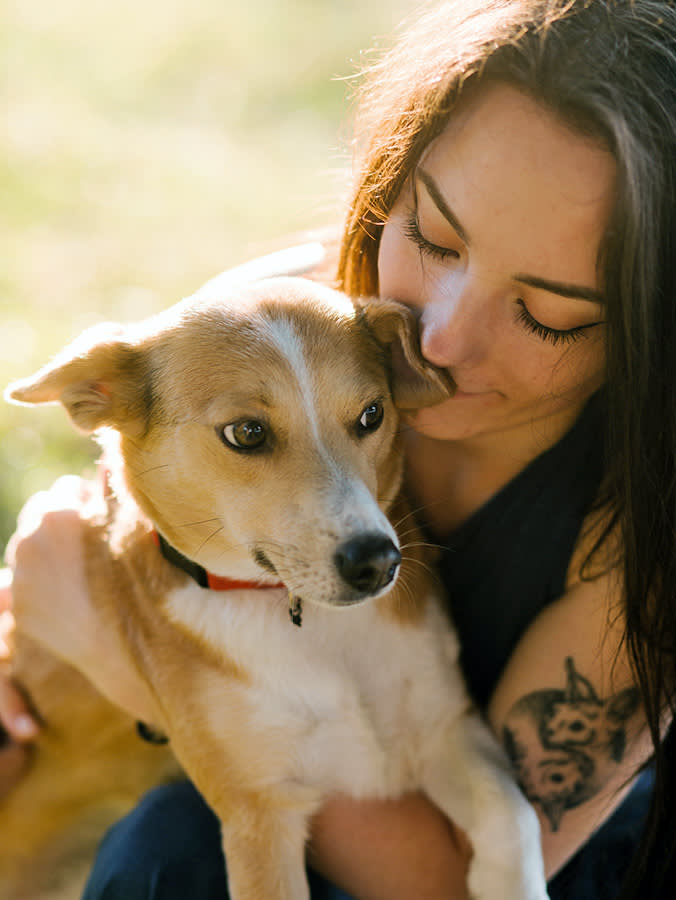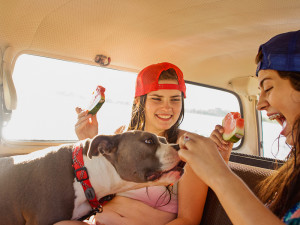Do Dogs Get Grumpy? Yes, So Here’s How to Cheer Them Up
Canine grumpiness is very real and the summer heat doesn't help.

Share Article
As someone who has been alive for (expletive deleted) years, I’m old enough to remember when Grumpy Cat ruled the Internet. But what dog parents knew then and what remains true today is why there was never a grumpy dog celebrity pet. It’s because they wouldn’t have been too remarkable. The truth is that this emotion and general display of displeasure is nothing new to the larger canine population. In fact, it’s quite common.
For example, my dog Banshee is nothing if not a grumpy old lady. Whenever I’m working, leaving, or doing anything without her, she’s all frowns and pouts. Lately, she’s also been acting extra cranky thanks largely to the heatwave currently hitting the East Coast. And despite blasting the air conditioner all day, she still blames me for her discomfort. I say this with apologies to our planet’s future, it’s hard being environmentally friendly with a sulking senior Pittie. But when does her face reflect more than a sassy attitude and suggest a real concern? I brought in an expert to find out.

Get (totally free) deals for food, treats, accessories, tech, and way more pet parenting must-haves.
opens in a new tabIs my dog grumpy?
In what is quickly turning into a near-daily tradition for me, I should first address whether I’m projecting human emotion onto my dog. Sure, when I suggest that Banshee feels guiltyopens in a new tab about keeping me up all night licking her paws, I’ll reluctantly admit that I might be exaggerating a bit. But grumpiness doesn’t fall under this category of anthropomorphismopens in a new tab, at least not always. As applied animal behaviorist and founder of R+Dogsopens in a new tab Renee Rhoades explains, it’s certainly a response pups are capable of.
“Anthropomorphism looks at attributing human characteristics or behaviors to animals or objects that cannot express these emotions, however, irritability is most definitely one of the emotions that dogs can express,” she says.
That being said, Rhoades does warn it’s possible to incorrectly project certain forms of grumpiness onto our pets. This is especially true when it’s seemingly inspired by spite, guilt, or rudeness — three emotions that dogs are not capable of feelingopens in a new tab. In these scenarios, this type of emotional projection will only make the situation worse. Not to mention, it could potentially do more harm to your pet as whatever is genuinely causing their grumpiness will likely go ignored.
What makes dogs grumpy?
It turns out dogs act grumpy for many of the same reasons humans do. Of course, dogs will never match those rare cranky souls constantly lashing out from a lifetime of bad decisions. But overall, there is a lot of crossover and Rhoades warns that this is a common oversight for pet parents. “I think that we can discount many of our dogs’ experiences possibly because we don’t understand that their emotions are largely parallel to our own,” she says.
Just like us, our pups might become prickly from a lack of sleep, being hungry, or simply boredom. And as Rhoades explains, dogs can even grow annoyed and sullen from day-to-day stress — how relatable! However, instead of being caused by having to complete the endless cycle of mundane occupational tasks necessary to reach the appropriate level of economic standing to obtain an ever-moving decent standard of living, this type of dog stress is usually just the product of a change in routine.
The most common cause, though, is physical discomfort. According to Rhoades, this can manifest in body language shifts that, when ignored, might even develop into behavioral issues like reactivity. That’s why any sudden changes should always be investigated. “One of the clearest ways for us to identify pain in our dogs is through behavior changes like irritability,” she says.
It turns out that my sulky pup isn’t the only one who reacts in such a manner to high temps. Thanks to the discomfort of wearing a permanent fur coat, the heat of summer can absolutely encourage additional crankiness for many dogs. Again, it’s not unlike how many humans react to the heat, except dogs don’t have to experience the heartbreak of a great hair day ruined by humidity. “Just like us, dogs will experience a rise in body temperature resulting in them sweating from exposure to hotter temperatures. The body’s natural response to a rise in temperature can feel uncomfortable, resulting in grumpiness,” Rhoades explains.
Biological factors like breed and age may also inspire grumpiness. Not unlike myself, dogs also appear to dislike facing the inevitability of time. “Older dogs are possibly more likely to experience grumpiness and again this is most likely largely going to be due to their physical discomfort,” Rhoades explains. Can’t say I’m too surprised given the grumpy senior pup I share my life with, though it’s nice to know she understands my pain when I constantly complain about my — still very young — back.
Regarding breed, Rhoades cautions against putting too much stock into it given the massive amounts of variability within each one. Still, there are a few standouts with genetic staples that might predispose them to a life of grumpiness. Mainly, she points to brachycephalic breedsopens in a new tab like Bulldogs, Pugs, and Shih Tzus, due to their common breathing difficulties. And considering my own temperament during allergy season, I can understand why they’re irritated about being constantly stuffed up.
How to turn that frown, etc., etc.
Of course, anyone who has come face to face with a grumpy dog knows the effect it can have on the heartstrings. That poutiness might make you feel helpless but there is plenty you can do to relieve their discomfort. Rhoades recommends inspecting a dog’s overall physical and mental well-being, what she refers to as their foundational wellness.
“Asking questions like, ‘How much daily stress are they encountering?’, ‘Do you have outlets for natural behaviors?’ and ‘Are they experiencing pain?’ Then becoming proactive by investigating the outcomes of those questions can start to open up the dialogue of why your dog is behaving a certain way,” Rhoades says.
To determine whether there is a physical or mental issue brewing, slight changes in body language can often be the largest indicator. Rhoades states that one of the best things dog parents can do for their pets is pay attention to their standard body language and react appropriately to any sudden shifts. “If you have a true understanding of body language, you have a better view into understanding how your dog is feeling,” she adds.
Body language that might indicate your pup is stressed or in physical pain includes an arched back, panting, holding their head below their shoulders, or trembling. In terms of other behavior, they might lick excessively, become restless, have changes in their sleeping habits, whimper, howl, or avoid touch. Mobility issues like limping, a newfound reluctance to walking, or moving slower than usual, may also indicate discomfort.
Identifying these changes will then help you, along with your vet, zero in on the root cause of their grumpiness. Afterward, it’ll be easier to alleviate their pain or stress and alter their grouchy disposition. More than anything, however, Rhoades makes it clear we should never punish our pets for acting grumpy and instead focus on what’s causing the moody response.
“Our dogs rely on us to care for them and keep them safe and we can do that best when we’re kind and empathetic to their needs,” she says.

Sean Zucker
Sean Zucker is a writer whose work has been featured in Points In Case, The Daily Drunk, Posty, and WellWell. He has an adopted Pit Bull named Banshee whose work has been featured on the kitchen floor and whose behavioral issues rival his own.
Related articles
![Black Lab playing in creek]() opens in a new tab
opens in a new tabWhy You Should Stay Far, Far Away From Blue-Green Algae This Summer
Consider getting a water-testing kit to keep your pup safe.
![Australian Shepherd on a hill during golden hour]() opens in a new tab
opens in a new tabHow to Hike Safely With Your Dog This Summer
Time to get your gear—and your pup—ready to go.
![Teenagers Feeding a Dog Watermelon While Sitting In Car On a Sunny Day]() opens in a new tab
opens in a new tab9 Healthy Summer Snacks to Share With Your Dog
Your pup wants in on your crudité platter.
![Australian shepherd panting with tongue out, walking ahead of owners.]() opens in a new tab
opens in a new tabHow to Keep Your Pets Safe During Extreme Heat Waves
As scorching, long-lasting temperatures become the new normal, here’s how to help keep your pets cool and healthy.
![Shepherd dog playing with yellow ball at the beach]() opens in a new tab
opens in a new tabHow to Keep Your Dog Safe at the Beach This Summer
5 tips to help your pup have fun in the sun — safely.
![Woman plays with her dog on the beach in the summer.]() opens in a new tab
opens in a new tab9 Warm Weather Hazards for Dogs—And How to Keep Your Pup Safe All Summer
So you both can have the best time ever.








